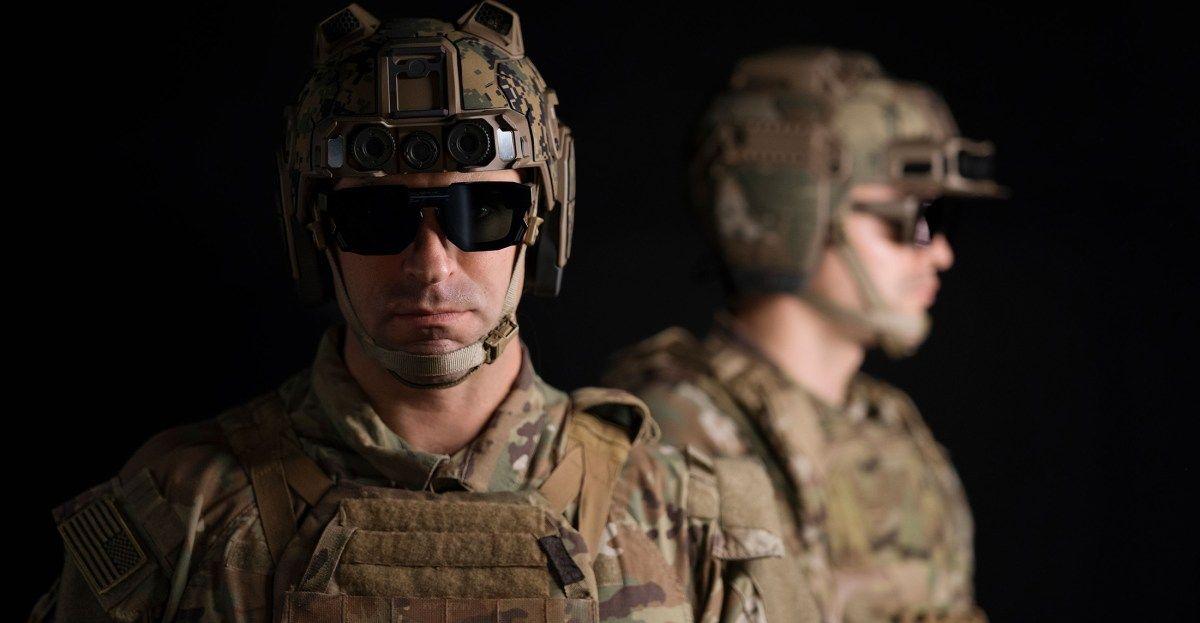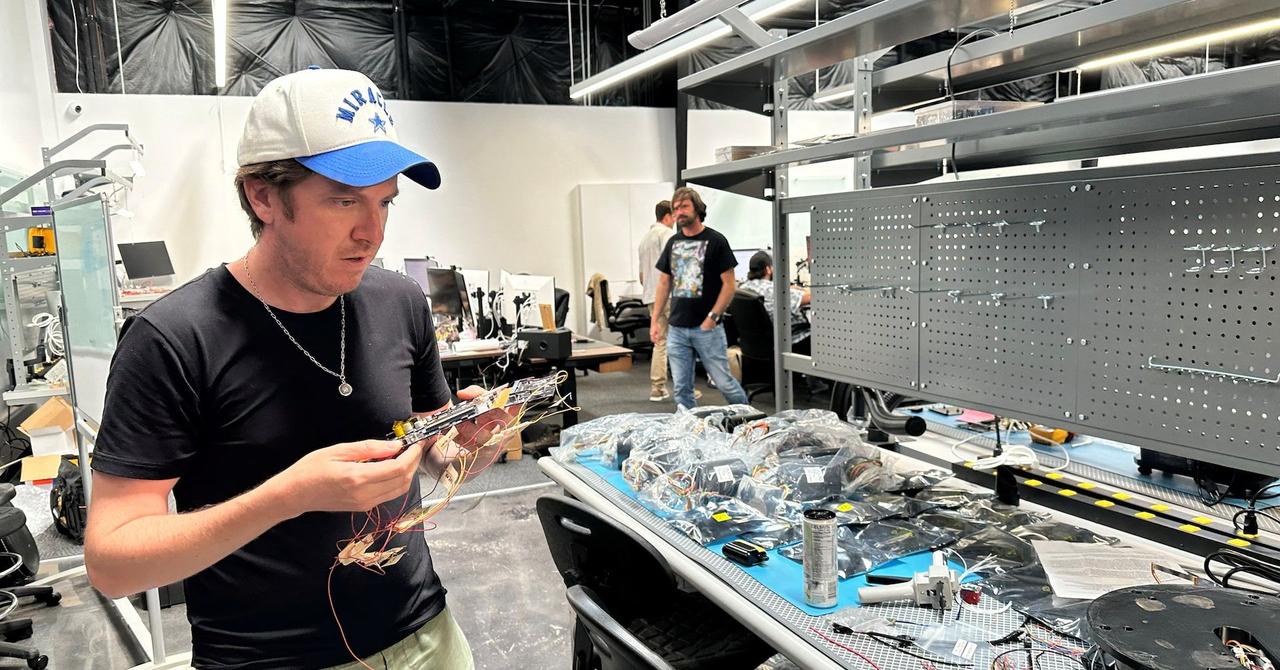Palmer Luckey's Controversial Views on Warfare and Technology
2 Sources
2 Sources
[1]
'I’m a Propagandist': Palmer Luckey on the Future of Warfare
In an hour long interview with Pepperdine University, the weapons merchant outlined his vision of the world. On Tuesday, Pepperdine University livestreamed a conversation between billionaire weapons merchant Palmer Luckey and university president Jim Gash. It began with a trailer for Anduril, Luckey’s defense firm, and ended with Luckey declining the gift of a leather-bound set of Lord of the Rings books. Between those two moments, Luckey talked about war. Dressed in a Neon Genesis Evangelion jacket draped over a bright yellow Hawaiian shirt, Luckey explained why wars happen. “War only starts between nation states when one or both sides misunderstand who is going to win the conflict,†he said. “If both sides understand who is going to win, it’s very rare for things to proceed to violence. Because the weaker nation, knowing full well that they’re going to lose says â€~OK, I’m going to capitulate, I’m going to give you what you want.’†“And that’s why, by the way, it’s important to have peace through strength,†he said as an aside. Luckey is preaching Game Theory here, a mathematical and logical view of the universe that underpins a lot of modern defense thinking. Game Theory is, in part, the reason America will spend almost two trillion dollars over the next decade installing nuclear missiles into silos in the Dakotas. There are a lot of problems with Game Theory as a defense strategy. Luckey acknowledged one immediately: ideological actors like Jihadists. “It’s very hard to engage in Game Theory with people who pursue the non-Game Theory optimal strategy,†he said. Sometimes the only way to win is not to play. American Historian and retired U.S. Army Colonel Andrew Bacevich has called out this kind of thinking before too. “Belief in the efficacy of military power almost inevitably breeds the temptation to put that power to work. â€~Peace through strength’ easily enough becomes â€~peace through war,’†he wrote in a 2010 essay. Game Theory and “peace through strength†are great ways of thinking if you want to sell weapons. Luckey is a defense contractor, after all. The conversation with Gash covered a variety of topics including VR and the state of journalism but eventually wound its way to war. While explaining the Tolkien origins of his company's name, Luckey pushed back on people who criticize him for celebrating the building of weapons of war. “Societies have always needed a warrior class that is enthused and excited about enacting violence on others in pursuit of good aims. I think that it's reasonable for philosophers to degrade those people and whine about how they're sick in the head." "But society needs them," he continued. "You need people like me who are sick in that way and who don’t lose any sleep making tools of violence." Luckey also endorsed the use of AI in weapons systems. “There is a shadow campaign being waged in the United Nations by many of our adversaries to trick Western countries that fancy themselves morally aligned into not applying AI for weapons or defense,†he said. “What is the moral victory in being forced to use larger bombs with more collateral damage because we are not allowed to use systems that can penetrate past Russian or Chinese jamming systems and strike precisely.†Luckey called out these critics who say that a robot should never be able to decide who lives and who dies. “And my point to them is, where’s the moral high ground in a landmine that can’t tell the difference between a school bus full of kids and a Russian tank?†In his younger days in college, Luckey studied journalism. Luckey told Gash someone had recently asked him if he still thought like a journalist. “Absolutely not, I’m a propagandist,†Luckey said. “I’ll twist the truth. I’ll put forward only my version if I think that that’s going to propagandize people to what I need them to believe.â€
[2]
Palmer Luckey: Every country needs a 'warrior class' excited to enact 'violence on others in pursuit of good aims'
After a three-minute hype video, complete with HD footage of drones colliding and military vehicles exploding, Anduril founder Palmer Luckey stepped onto the stage at Pepperdine University in Malibu, California, on Tuesday afternoon. In an hour-long conversation with Pepperdine University president Jim Gash, the billionaire raged against America's adversaries, endorsed completely autonomous weapons, and hinted at an Anduril IPO. In 2017, Luckey co-founded defense tech company Anduril, last valued at $14 billion, with Trae Stephens, Matt Grimm, Joe Chen, and Brian Schimpf. He made it clear he had no hesitation about Anduril building weapons. "Societies have always needed a warrior class that is enthused and excited about enacting violence on others in pursuit of good aims," he told Gash. "You need people like me who are sick in that way and who don't lose any sleep making tools of violence in order to preserve freedom." Luckey, donning his usual uniform of a Hawaiian shirt and mullet, walked Gash through the early hours of the war in Ukraine -- and why he believes Anduril could've made a big impact. Luckey said he first met Ukrainian President Volodymyr Zelenskyy in 2019, after Zelenskyy had read about Anduril in a Wired article. He asked Luckey if Ukraine could acquire some of Anduril's border control technology. "Unfortunately, the State Department wasn't really wasn't really keen on Ukraine at that point in time," Luckey said. "Look, if we were able to provide real-time intelligence with targeting-grade tracks of all of Russia's most critical weapons systems to Ukraine days before their air force was eliminated, before their long range precision fires were exhausted, " he said. "I think that could have made a really big difference." Anduril did end up supplying weapons to Ukraine by week two of the war, according to Luckey. He then aligned himself with many Silicon Valley founders and called for unfettered AI development (Anduril's products are powered by its AI platform, Lattice). He insisted there is currently "a shadow campaign being waged in the United Nations right now by many of our adversaries" to trick Western countries into not aggressively pursuing AI. "[Our adversaries] use phrases that sound really good in a sound bite: 'Well can't you agree that a robot should never be able to decide who lives and dies?'" Luckey said. "And my point to them is, where's the moral high ground in a landmine that can't tell the difference between a school bus full of kids and a Russian tank?" The development of completely autonomous weapons -- weapons that do not need a human's input on who lives or dies -- is incredibly controversial. The US government does not purchase them, and even Anduril co-founder Stephens has said he would not want to build them. "Human judgment is incredibly important," he told Kara Swisher last year. "We don't want to remove that." Luckey ended the talk by hinting at Anduril's desire to eventually go public. "The reality is for political reasons, practical reasons, financial reasons, a privately traded company is never going to win something like the trillion-dollar joint strike fighter [jet] effort," he said. "It's just not going to happen. Congress won't allow it to happen." People have floated the possibility of being acquired. "I just point to how that went from me last time," Luckey said, referencing how he was pushed out of Facebook in 2016 after selling his previous startup, virtual reality company Oculus. As he got up to leave, Gash tried to gift him a leather-bound collection of "The Lord of the Rings," which is where Luckey got the name "Anduril." But Luckey politely declined. "I cannot fit that on my motorcycle," he said.
Share
Share
Copy Link
Palmer Luckey, founder of Anduril Industries, shares his controversial perspectives on warfare, technology, and the future of combat in recent interviews. His statements have sparked debates about the ethics of military technology and the role of AI in modern warfare.

Palmer Luckey's Vision for Future Warfare
Palmer Luckey, the founder of defense technology company Anduril Industries, has recently made waves with his provocative statements about the future of warfare and technology. In a series of interviews, Luckey has shared his views on the role of artificial intelligence in combat, the necessity of a "warrior class," and the ethical implications of modern military technology
1
.Embracing the Role of "Propagandist"
Luckey, known for his controversial opinions, has openly embraced the label of "propagandist" for his company's mission. He argues that Anduril's work in developing advanced military technology is essential for maintaining global stability and protecting democratic values. This stance has raised eyebrows among critics who question the ethics of promoting warfare technology
1
.The Necessity of a "Warrior Class"
One of Luckey's most contentious claims is that every country needs a "warrior class" – individuals who are eager to engage in violence for what they perceive as good causes. This statement has sparked debate about the glorification of violence and the potential consequences of such thinking in modern warfare
2
.AI and the Future of Combat
Luckey envisions a future where artificial intelligence plays a central role in warfare. He believes that AI-powered systems will become increasingly autonomous, making critical decisions in combat situations. This perspective has raised concerns about the ethical implications of removing human judgment from battlefield decisions
1
.Anduril's Technological Advancements
As the founder of Anduril Industries, Luckey is at the forefront of developing cutting-edge military technology. The company's focus on AI, autonomous systems, and advanced sensors has positioned it as a significant player in the defense industry. However, this rapid advancement in military technology has also led to discussions about arms races and the potential for escalating global conflicts
2
.Related Stories
Ethical Concerns and Public Reaction
Luckey's statements and Anduril's work have not been without criticism. Many ethicists and technology experts have expressed concerns about the implications of advanced AI in warfare and the potential for autonomous weapons to lower the threshold for armed conflict. The public reaction to Luckey's views has been mixed, with some supporting his vision for technological advancement in defense, while others worry about the moral hazards of his approach
1
2
.The Broader Implications for Society
The controversy surrounding Palmer Luckey's statements extends beyond the realm of military technology. It touches on broader societal questions about the role of technology in shaping our future, the ethics of warfare in the 21st century, and the responsibilities of tech leaders in influencing global policy. As the debate continues, it's clear that Luckey's vision for the future of warfare will remain a topic of intense discussion and scrutiny in the coming years.
References
Summarized by
Navi
Related Stories
Anduril's EagleEye: Palmer Luckey and Meta Collaborate on Advanced Military Mixed Reality System
13 Oct 2025•Technology

Anduril Takes Over Microsoft's $22 Billion US Army AR Headset Program
12 Feb 2025•Technology

Anduril's $28 Billion Valuation: AI Defense Tech Startup Nears Massive Funding Round
09 Feb 2025•Business and Economy

Recent Highlights
1
ByteDance's Seedance 2.0 AI video generator triggers copyright infringement battle with Hollywood
Policy and Regulation

2
Demis Hassabis predicts AGI in 5-8 years, sees new golden era transforming medicine and science
Technology

3
Nvidia and Meta forge massive chip deal as computing power demands reshape AI infrastructure
Technology





